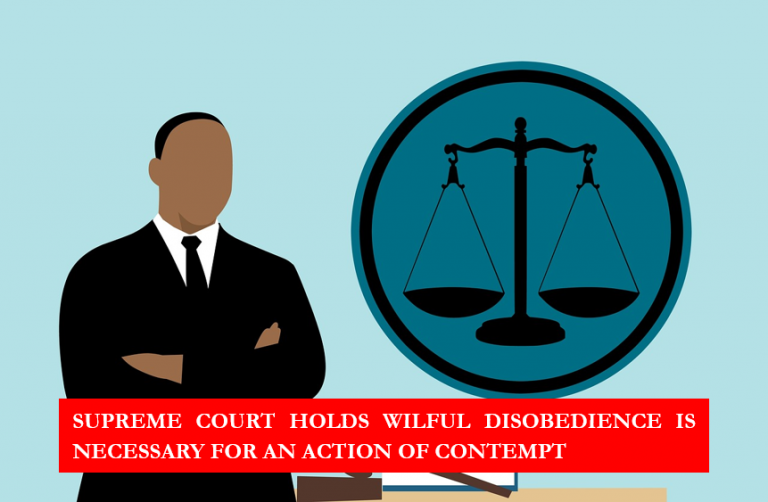SUPREME COURT HOLDS WILFUL DISOBEDIENCE IS NECESSARY FOR AN ACTION OF CONTEMPT
The Two Judge Bench of the Hon’ble #SupremeCourt of India comprising of Justices A.M. Khanwilkar and B.R. Gavai passed a Judgment dated 03-06-2021 in the case of Abhishek Kumar Singh v. G. Pattanaik & Ors. {Contempt Petition (Civil) Nos. 625-626 of 2019 in Civil Appeal Nos. 11017-11018 of 2018} held that #Contempt action can only be taken where there has been a wilful #disobedience of Court Order has been established.
In the present case, the Uttar Pradesh Jal Nigam (Respondent Corporation) was directed by the Hon’ble Supreme Court of India to comply with the Judgment of the High Court of Judicature at Allahabad (High Court) dated 28-11-2017 in a batch of writ petitions (leading case being WritA No. 37143/2017) and pass a fresh, reasoned order. The Respondent-Corporation had annulled the recruitment process pursuant to which the Petitioners were employed, by virtue of which the services of the Petitioners were terminated. These Orders dated 4-12-2018 and 2-3-2020 were set aside by the High Court vide Order dated 15-11-2018 and the Petitioners were given the permission to work and be paid regular monthly salary. Subsequently, this was upheld by the Apex Court and directions were issued to comply with the said Order. However, there was a gross violation of the said directions and as a result of which, Contempt Petitions were filed in the Apex Court and the it was prayed that the Respondents be proceeded for having committed wilful disobedience of the order of this Court.
After taking into consideration the arguments advanced by the Parties to the dispute, the Bench noted that the Orders passed by the High Court and the Hon’ble Supreme Court do not contain explicit direction to reinstate the Petitioners with continuity of service and back wages as such.
Instead the expression used is only, the expression used by the High Court is “to permit the petitioners to work on the concerned posts which were held by them at the time of their termination and “to pay them regular salary month by month” and “as and when the same accrues to them”. Thus understood, it is not a case of wilful disobedience of the orders of the Court.”
The Court noted that “Thus, in order to punish a contemnor, it has to be established that disobedience of the Order is “wilful”. The word “wilful” introduces a mental element and hence, requires looking into the mind of a person/contemnor by gauging his actions, which is an indication of one’s state of mind. “Wilful” means knowingly intentional, conscious, calculated and deliberate with full knowledge of consequences flowing therefrom. It excludes casual, accidental, bona fide or unintentional acts or genuine inability. Wilful acts does not encompass involuntarily or negligent actions. The act has to be done with a “bad purpose or without justifiable excuse or stubbornly, obstinately or perversely”. Wilful act is to be distinguished from an act done carelessly, thoughtlessly, heedlessly or inadvertently. It does not include any act done negligently or involuntarily. The deliberate conduct of a person means that he knows what he is doing and intends to do the same. Therefore, there has to be a calculated action with evil motive on his part.
However, in the present case the Bench observed that there was no wilful disobedience and the Petitioners have a right to be heard and the Respondents must afford this opportunity to the Petitioners similarly placed persons before annulling the entire selection process and issuing the Termination Order under challenge.
Therefore, in light of these observations the Apex Court dismissed the Contempt Petitions.
Suchitra Upadhyay
Associate
The Indian Lawyer & Allied Services





































Leave a Reply